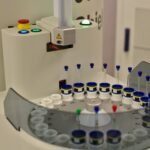A large phase III study known as SERENA-6 is attracting wide attention for challenging the way resistance is handled in hormone receptor positive, HER2 negative advanced breast cancer. Instead of waiting until tumours clearly progress on scans, the trial tested whether patients can benefit from switching therapy earlier when the first molecular signs of resistance appear. The approach was made possible through the use of liquid biopsies, which track tumour DNA circulating in the bloodstream.
The study focused on patients receiving standard treatment with an aromatase inhibitor plus a CDK4/6 inhibitor. During treatment, blood samples were monitored for ESR1 mutations, a common genetic change that signals emerging resistance to aromatase inhibition. If such mutations were detected before visible tumour growth, patients were switched from an aromatase inhibitor to camizestrant, a next-generation oral selective estrogen receptor degrader. Camizestrant was given alongside the CDK4/6 inhibitor to maintain backbone therapy.
Early Intervention Translates Into Longer Control
Results from SERENA-6 were striking. Patients who made the early switch to camizestrant achieved a median progression free survival of about 16 months, compared with just over 9 months for those who stayed on the aromatase inhibitor. That represents a 56 percent reduction in the risk of disease progression or death.
The trial also looked at quality of life. Using standard patient-reported outcome measures, researchers found that those switched to camizestrant maintained good global health status for a median of 23 months. In contrast, those who remained on standard therapy reported deterioration after about 6 months. That 18-month gap highlights not only the clinical effectiveness of the strategy but also its tangible benefit for how patients feel day to day.
Importantly, safety outcomes remained consistent. The switch to camizestrant did not introduce unexpected toxicities, and side effects were in line with what is typically seen with hormone therapies combined with CDK4/6 inhibitors.
A New Era of Molecularly Guided Care
The implications of SERENA-6 reach beyond breast cancer. This trial illustrates how ctDNA monitoring can redefine cancer care by anticipating resistance before it translates into clinical progression. Instead of playing catch-up once tumours grow back, clinicians may now have a tool to stay a step ahead.
For HR-positive, HER2-negative breast cancer specifically, the findings suggest a major change to first-line management. The addition of routine ctDNA monitoring could allow oncologists to tailor therapy dynamically, switching drugs at the moment resistance mutations appear. While long-term survival data are still pending, the early benefits in progression free survival and quality of life make a compelling case for guideline updates in the near future.
Beyond the numbers, this trial reflects a shift in philosophy: cancer treatment is no longer just about what drugs to give, but also about when to give them. Timing, guided by molecular clues, could prove just as decisive as drug choice.
For patients and families, the trial offers hope of longer control, better wellbeing, and more personalised care. For health systems, it highlights the importance of investing in liquid biopsy technology and integrating molecular monitoring into everyday oncology practice.















